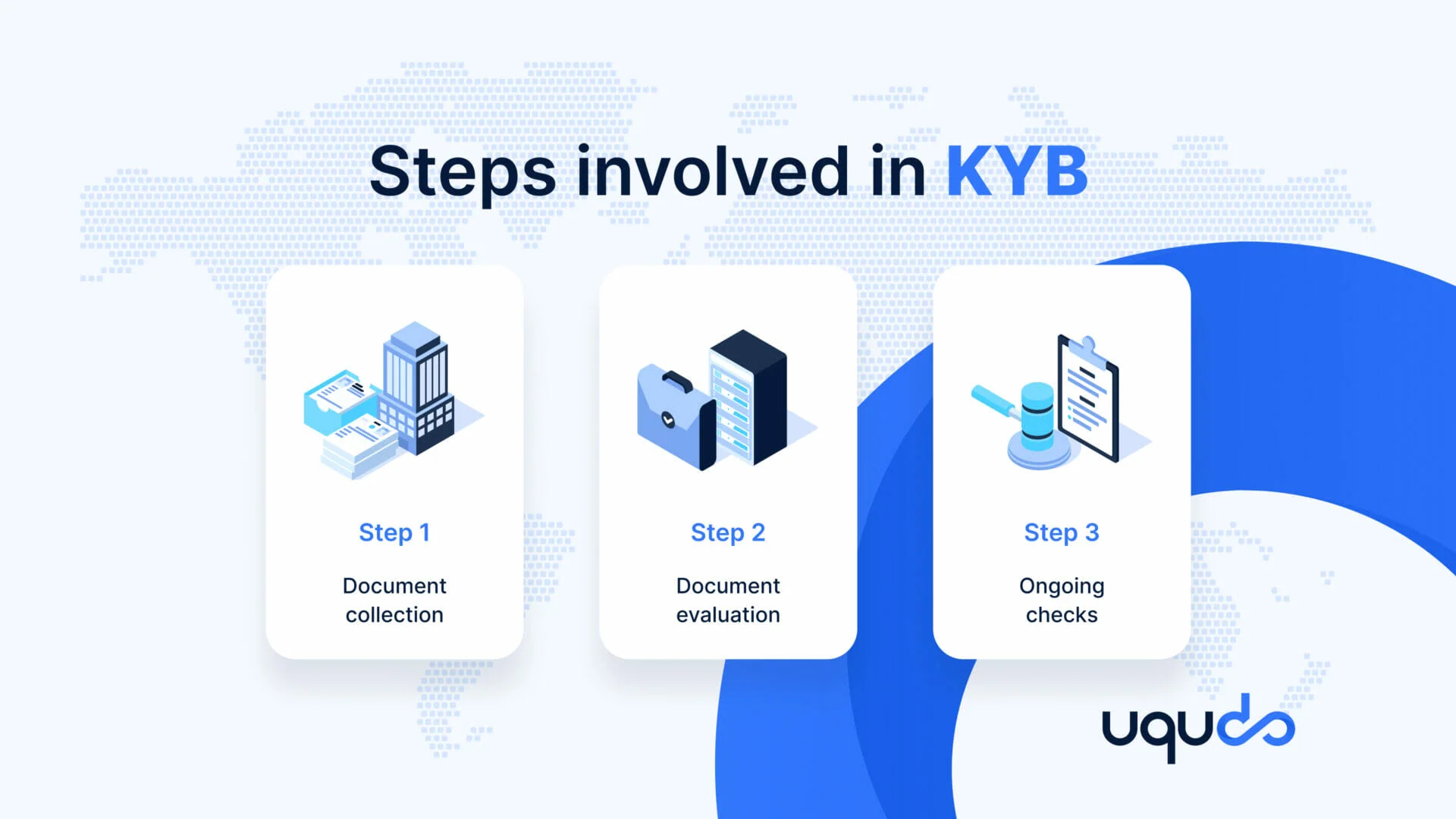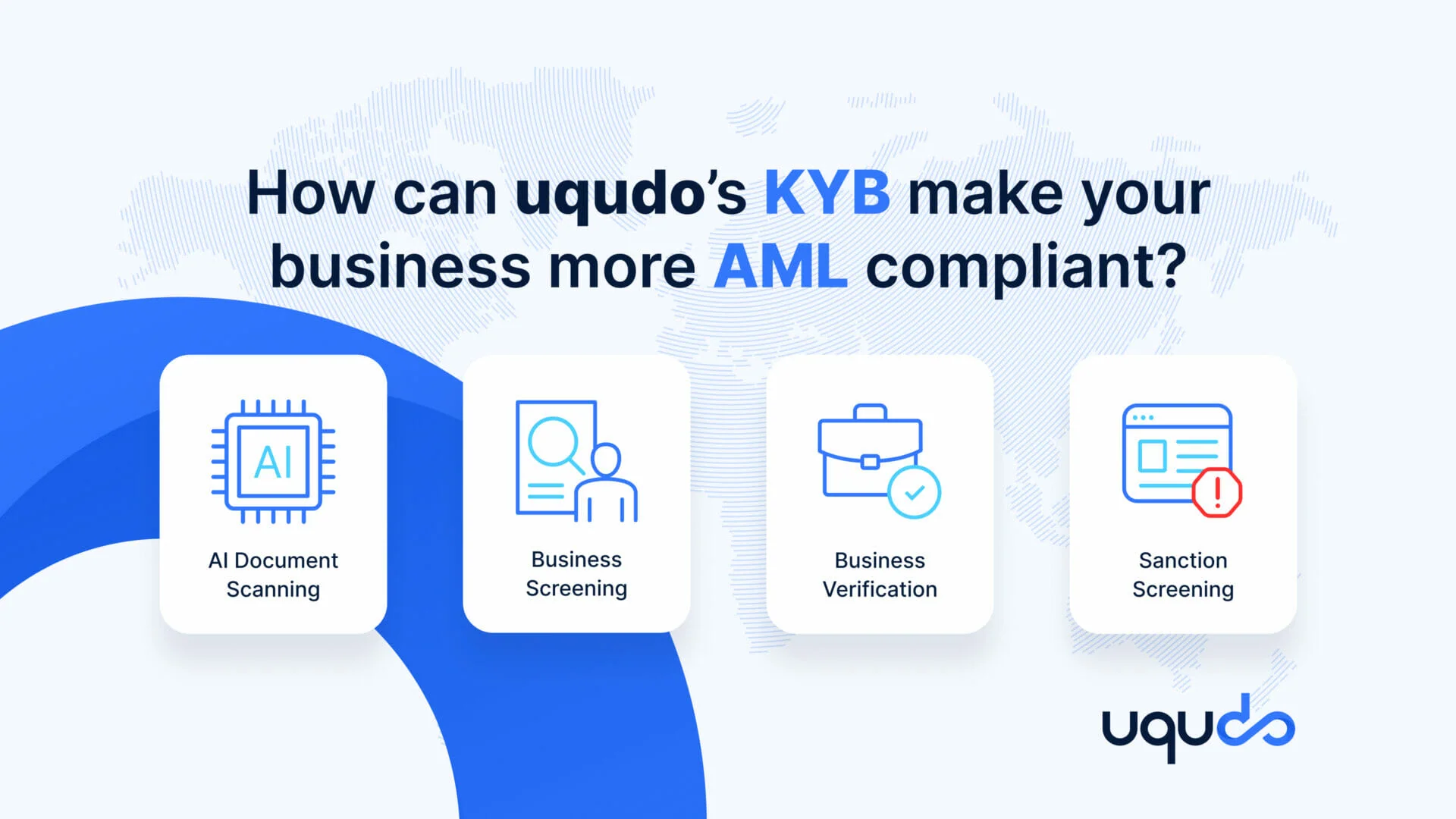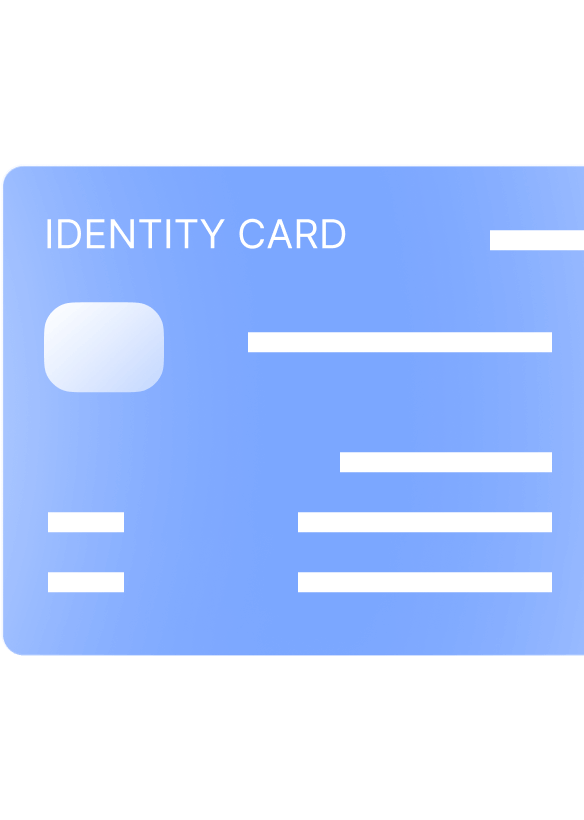Table of Contents
- What is KYB? Why is it necessary for your business?
- What is the difference between KYB and KYC?
- Who needs KYB?
- What are the components of KYB?
- What documents are required for KYB?
- Steps involved in KYB
- Advantages of Digitalized KYB
- How does KYB facilitate AML compliance?
- What are the key benefits of KYB?
- How can uqudo’s KYB make your business more AML compliant?
- Why use uqudo for KYB?
What is KYB? Why is it necessary for your business?
Similar to its Know Your Customer (KYC) counterpart, Know Your Business (KYB) refers to the procedure of an organization verifying the identity of its clients and suppliers. KYC mandates banks and financial institutions to verify their customers, whereas, in the context of verifying the legitimacy of other businesses, companies follow the KYB verification guidelines.
Developing an efficient KYB guideline is very important for businesses nowadays because financial criminals have evolved from single-handedly committing financial fraud to using business ventures and shell companies for their financial fraud activities. It is essential for organizations to understand whether the businesses they are dealing with are directly (or even indirectly) associated with fraudulent activities, to minimize fines and penalties.
An important part of a company’s Anti Money Laundering (AML) compliance, rigid KYB solutions protect businesses from incurring losses due to fraudulent activities of their clients. It is important to verify the corporate information of a client as well as the senior management of the company a business is dealing with. Companies that do not have a stringent know your business verification policy in place are at serious risk since if their client is guilty of financial fraud, they are also implicated by association.
It is also necessary for firms to identify and verify the Ultimate Beneficial Owner (UBO), which refers to the owner or person in charge of a company. To comply with AML laws of a region and evaluate the risk potential of the business it is very important for banks and other financial institutions to know the individual/s who directly owns or manages the organization.
What is the difference between KYB and KYC?
KYB and KYC are both essential due diligence components of AML compliance and vary only in the kinds of customers that are being identified and verified. KYC refers to verifying individuals that a bank or financial institution is dealing with. For KYC verification, the documents required are those which validate the identity of the individual, including government IDs and address proofs. In KYB, the verification is that of a business or company that a firm is building a relationship with, and for this, the documents are those which verify the business. Verification for KYB involves documents like the legal papers of the company, shareholder information, and tax invoices.
KYB not only helps companies comply with AML regulations but also helps protect an organization’s interests before establishing a potential relationship with a client. This is because it is necessary for companies to be aware of potential risks like money laundering, corruption, and politically exposed persons (PEPs) before associating with other businesses.
Who needs KYB?
Know Your Business (KYB) is an important feature of Anti-Money Laundering (AML) and Combating the Financing of Terrorism (CFT) regulations. Since AML is a legal regulation in most countries, complying with KYB is also necessary for businesses. Some key industries where KYB is essential are:
- Fintech companies
- Cryptocurrency and blockchain companies
- Retail and commercial banks
- Investment banks
- Insurance companies
- Telecommunication firms
- Credit unions
- Audit firms
- Brokerage firms
- Gaming firms
- Real estate companies
Though KYB regulations are ultimately mandatory for most banks and financial institutions under AML compliance, it is beneficial for every kind of business to do a thorough verification of their clients to protect themselves against financial criminals.
What are the components of KYB?
While implementing KYB verification procedures, it is necessary that financial institutions understand if the risk profiles of their clients comply with the AML regulations of their respective regions. This procedure also needs to be documented accurately.
- Due Diligence
The most important procedure of KYB, it is necessary for firms to perform due diligence while dealing with clients so that they can verify the identity of the Ultimate Beneficial Owner. It is necessary to identify the UBO in order to evaluate the risk potential of the client so that enhanced AML procedures can be enforced. Adequate due diligence also helps flag high-risk clients. - Monitoring transactions
Thoroughly analyzing the transactional activity of a client can help identify suspicious activities that may indicate involvement in money laundering or financial crime activities. If there are too many high-value transactions, it might indicate financial fraud. - PEP Screening
Politically Exposed Persons (PEP) are sometimes a category of high-risk individuals because of their ease of access to legal authorities. Identifying PEPs and evaluating their risk profiles in compliance with AML laws is imperative to reduce reputational damage while dealing with new businesses. - Sanction Screening
A sanction list consists of individuals or organizations involved in financial crimes including money laundering, tax evasion, terrorist financing, and corruption. By flagging individuals and businesses on the sanction list, organizations can protect themselves from indirectly assisting in financial crimes.
What documents are required for KYB?
Like KYC, the documents required for KYB differ according to the jurisdiction of the region, but in general, the information required are:
- Company name and address
- Business documents including certificate of incorporation
- Incorporation date
- Company operational status
- Official beneficiaries
- Key management personnel
- Subsidiaries
Steps involved in KYB

The KYB procedure begins while onboarding a new client and goes on for the entire duration of the company-client relationship. Ongoing checks are very important in the verification process, which includes other steps such as
- Document collection
The first step of KYB involves obtaining all the documents required, which have company details including incorporation date, operational status, and proof of address. Companies can also ask for shareholder information, tax returns as well as UBOs. - Document/information evaluation
A bank or financial institution then has to assess all the information provided by the firm and evaluate its risk profile. Along with this, PEPs and Sanctions Screening have to be accurately done to ensure that the client is not involved in suspicious activities. - Ongoing checks
Once a client is onboarded, it is necessary to periodically evaluate their legal activities and perform AML screenings to ensure that all activities are legalized and prevent any financial crimes.
Advantages of Digitalized KYB
Banks and financial institutions deal with huge amounts of money on a daily basis. With these large funds, it is very important that they have a system in place that protects them from financial criminals using high-tech security. An estimated $2 trillion is laundered annually and more than 90% of money laundering cases go undetected, which shows that most financial institutions don’t have a secure method to prevent financial fraud. Along with this, numerous organizations face hefty fines for not following anti-money laundering regulations.
Digital KYB services help banking systems develop a strong AML compliance procedure, which goes a long way toward financial security. KYB involves monitoring the financial activities of clients and their businesses which in turn helps identify suspicious activity. With digitalized KYB, banks and financial institutions can obtain adequate information about the authenticity and credibility of their clients. KYB also involves verifying numerous documents, which tends to be easier when digitalized.
Advantages of a digitalized KYB procedure are:
- Reduces fraud
With the digital onboarding of clients, banks and financial institutions have access to more resources to safeguard themselves from financial fraud. Digitalising the KYB procedure also helps financial bodies to keep better track of their client’s transactional activities. - Security
Since KYB involves numerous highly confidential documents, having digital KYB solutions makes the entire procedure secure. - Minimizes time required
When the entire KYB procedure is online with limited manual intervention, banks and financial institutions save a lot of time. Also, real-time identity verification reduces the possibility of identity theft and fraud. - Cost-efficient and eco-friendly
Digital KYB involves technology like Artificial intelligence (AI), Machine Learning, and Image Processing. Since the cost of running these are low, KYB solutions are cost-efficient. Also using digital methods reduces paper costs.
How does KYB facilitate AML compliance?
A proper KYB procedure is key for successful AML compliance, which has made KYB solutions a necessity for businesses today. KYC and KYB are conducted to protect banks and other financial institutions from fraud, money laundering, and terrorist financing. With an increase in financial crimes, numerous regulators have come into place including Financial Action Task Force (FATF) which has laid out numerous rules for AML compliance.
AML compliance is necessary to safeguard businesses from numerous financial crimes, and because of these regulations, many firms which fail to comply with AML rules are fined heavily for non-compliance. In 2021, the financial industry was fined $2.7 billion for non-compliance with AML, KYC, and data privacy.
KYB helps financial institutions identify shell companies, which pose a great risk to AML compliance. Shell companies are those firms that exist only on paper but are not actively involved in any sort of business. Though not all shell companies are illegal, many are used at the forefront of money laundering activities. Financial criminals generally use shell companies for tax evasion and money laundering. A major component of KYB involves identifying if any of the clients are using shell companies for any purpose. This helps financial institutions identify suspicious activities.
What are the key benefits of KYB?
A major component of any B2B company’s AML compliance, KYB is essential for establishing the client’s identity and evaluating their risk potential. Companies need to perform KYB due diligence to comply with government regulations, the degree of which depends on the risk profile of the client. With digitized KYB, companies can verify data from numerous sources, which was quite tedious when done manually.
The main advantages of KYB are:
- Evaluating the risk profiles of clients by assessing their financial history and assets owned helps companies identify changes in their transactional behaviour which sometimes indicates financial fraud.
- Since the identity of the company and key beneficiaries is verified during KYB, it limits fraud that occurs due to identity theft.
- Prevents the occurrence of various financial crimes like money laundering, tax evasion, and terrorist financing.
- Makes the financial industry more trustworthy by ensuring lesser financial crimes and protecting the economy from tax evaders.
How can uqudo’s KYB make your business more AML compliant?
uqudo’s KYB service has access to the world’s largest company database, which comes with advanced company verification and screening for risk-free B2B partnerships.
What distinguishes us from other KYB providers is not only the substantial database but also the cost efficiency of our platform to identify and verify businesses. Along with this, uqudo’s PEP and sanction scanning can help you identify the risk potential of your prospective business partners.

Our KYB procedure involves the following steps:
- AI Document Scanning
The AI scanner first reads all the company documents and trade licenses to extract critical data related to the company in milliseconds. - Business Verification
The most important step in KYB verification, the extracted data is then verified for business authenticity. Our database includes more than 400 million companies and company documents from numerous countries which are used for verifying the legality of your business partner. - Business Screening
The next step is the identification of the Ultimate Beneficial Owner (UBO), which refers to the person who ultimately owns the business. This is an essential step because evaluating the risk profile of the UBOs helps in assessing the chances of potential fraud. - Sanction Screening
In this step, the major shareholders and management personnel are identified and screened to see if they have any person involved in their business who is politically exposed (eg. government officials or people in state-owned enterprises) or has an adverse media image related to financial crimes.
Why use uqudo for KYB?
KYB is a time-consuming process when done manually because of the large amount of data that has to be collected and verified. uqudo’s full-fledged platform provides KYB solutions that can help reduce your time and operational costs. Our large database is something that has been developed by years of work, and that is a key factor that makes our KYB process time efficient. A key factor to consider in identity verification is the confidentiality of data and our complete compliance with AML regulations ensures that.
For more information related to KYB, get in touch with us.
Secure, frictionless,
& fully compliant digital onboarding.
Integrated seamlessly within your app.




